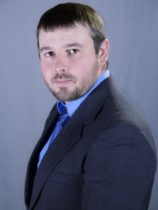 Since joining the PhD program in 2012, Andrew Druckrey has developed an impressive record in pursuing his geotechnical engineering research. So far he has published six journal papers, with four more under review, and published seven conference papers. He’s also made presentations at conferences in the U.S. and overseas and received five academic scholarships. In June, he’ll defend his dissertation, entitled, “3D Multi-Scale Behavior of Granular Material using Experimental and Numerical Techniques,” and he’s expected to graduate in August.
Since joining the PhD program in 2012, Andrew Druckrey has developed an impressive record in pursuing his geotechnical engineering research. So far he has published six journal papers, with four more under review, and published seven conference papers. He’s also made presentations at conferences in the U.S. and overseas and received five academic scholarships. In June, he’ll defend his dissertation, entitled, “3D Multi-Scale Behavior of Granular Material using Experimental and Numerical Techniques,” and he’s expected to graduate in August.
This rising star in the geotechnical field jumped at the opportunity to pursue his PhD at UT after receiving his Masters in Geotechnical/Pavement Engineering from the University of Wisconsin, Milwaukee. Dr. Khalid Alshibli, who had been on Druckrey’s Master’s thesis committee, had an opening, and Druckrey knew it would afford him the rare opportunity to work under the advisement of someone whose work he admired in a place that was a great fit for him.
“It is fun to work with Andrew,” said Alshibli. “He is a very talented creative researcher. He progressed in his research with minimum supervision.”
Druckrey’s research involves experimental and numerical investigation of granular material response at various length scales. At the micro-scale, he quantifies physical sand particle properties with the use of high resolution synchrotron micro-computed tomography (SMT), as well as investigates experimentally and numerically the mechanisms involved in single particle fracture. At the meso-scale, he researches particle-to-particle interaction during global loading by analyzing particle kinematics and formation of localized shearing bands. Also at the meso-scale, he studies granular material fabric and fabric evolution, and the properties of the material that influence fabric. He is also involved with modeling the continuum response using micro- and meso-scale input, seeking to link the behavior across the scales. This fundamental research is a first step towards more accurate predictions of soil behavior during loading. Better ability to predict soil behavior will minimize experimental efforts and costs, leading to safer and more cost efficient foundations.
In addition to his research activities, Druckrey has also proven to be an outstanding lab instructor. He has taught many courses, including the CE210 lab where he is fully responsible for teaching a challenging laboratory. Geomatics (CE210) involves the collection, analysis, and interpretation of data relating to the earth’s surface, which is of vital importance to any civil engineering project. The geomatics lab gives students hands-on surveying experience in collecting data for use in engineering design and staking out potential construction. Druckrey typically worked with two-to-three labs per week, where he gave a demonstration of the equipment use at the beginning of class and supported the students as they performed surveying work in the field. Most notably he was asked to develop tutorial videos to replace his own teaching demonstration to use well into the future. The tutorial videos are designed to thoroughly and correctly demonstrate each lab while keeping teaching consistency throughout each semester.
Druckrey has accepted a job at Caterpillar in their geomechanics group beginning in July, where he’ll apply his knowledge to further research machine-soil interaction. There, he will help develop virtual simulations of machine interaction with soil to help determine the best design for each component of each machine. “My long-term career goal is to advance my career within Caterpillar into management of geomechanics involved research,” he said.
Druckrey feels that UT has been a superior place for him to further his expertise in soil behavior and modeling and prepare for a career in the field. “Throughout my PhD career at UT I have developed and refined many valuable professional qualities,” he said. “My experience here has provided me with fundamental and advanced research abilities that will allow me to handle any research problem.”